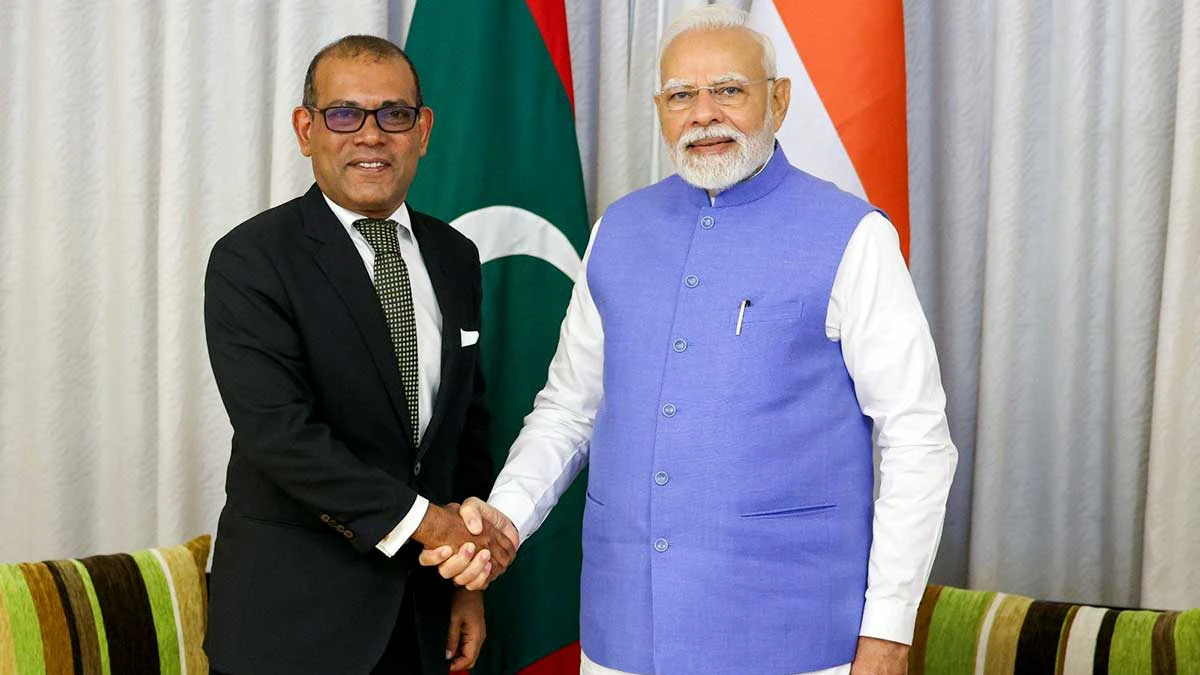Interview/ Mohamed Nasheed, former president of the Maldives
Mohamed Nasheed co-founded the Maldivian Democratic Party (MDP) in 2003 after going through years of imprisonment and exile under the rule of president Maumoon Abdul Gayoom.
Many call Nasheed the “Mandela of the Maldives” for his nonviolent, pro-democracy activism. He made history in October 2008 by winning the country’s first multi-party presidential election, ending Gayoom’s 30-year rule and bringing in a new era of democracy. In 2009, he drew global attention by convening the world’s first underwater cabinet meeting to bring to the fore the existential threat climate change poses to his nation. Nasheed survived an assassination attempt in Male in 2021. Excerpts from an interview:
Q/ How do you assess the current state of relations between India and the Maldives?
A/ You would have noticed that Muizzu’s government initially came to power with strained relations with India. However, soon after assuming office, he swiftly recalibrated his approach, and we are pleased that relations with India are now back on a positive and amicable footing.
It is important for us to be able to connect with India’s rapid economic growth. India is now one of the largest economies in the world. We also understand that India’s prosperity is not meant to be achieved in isolation or at the expense of its neighbours.
India is broad-shouldered and resilient: people may say different things in various quarters, but India has always maintained its strategic focus.
Q/ Was the ‘India Out’ campaign in early 2024 necessary? It hurt many Indians and strained bilateral ties.
A/ It was deeply embarrassing for us as well. This campaign did not reflect the broader sentiments of the Maldivian people. I am pro-India, and I know a vast majority of the Maldivians share the same outlook. It is very unfortunate that this campaign took place.
We have strong friendships with Indians across various walks of life, and people-to-people ties are extremely close. We read the same books, watch the same films and enjoy the same food: we are, in many ways, the same people. It was not pleasant at all, and we are truly sorry this unfolded during the election period.
Q/ India has historically played a key role in the Maldives’ security. Do you believe Indian military personnel should remain stationed there?
A/ In 1988, the People’s Liberation Organisation of Tamil Eelam (PLOTE) attempted a coup in the Maldives. We managed to hold out until India intervened and thwarted the coup. It showed us how vital security cooperation with India is.
No terrorist organisation should ever believe they can take control of the Maldives. To ensure that deterrence, we must have clear safety and security agreements with India.
We live in an interconnected world, and I cannot think of any country that does not, in some form, have security arrangements with foreign nations. For small island nations like ours, it is essential to have a wider security framework that goes beyond our own limited capacity. There are threats not only from sovereign states but also from terrorist organisations. Therefore, it is extremely important to maintain clarity on security arrangements and to sustain strong understandings with India.
Q/ How do you view your country’s democratic progress since then?
A/ I think we have done reasonably well. Since 2008, we have successfully transferred power through the ballot four times. We have held four presidential elections, four parliamentary elections and four local council elections-all of which have been generally satisfactory.
In 2008, our national income was only seven billion rufiyaa [currency of the Maldives]. Today, it exceeds 30 billion. We introduced a taxation system and implemented social protection programmes. We also gained access to international capital markets and took on debt, which now presents a challenge that must be managed carefully.
In terms of freedom of expression and assembly, I believe we are doing better than many other countries. Not many Islamic nations have been able to maintain functioning democracies, and some even argue that democracy is incompatible with Islam. But the Maldives is proof that this is not true…. We were able to amend the constitution and hold free and fair elections. We had opportunities to topple governments on the streets but chose not to. I believe this helped us consolidate our democratic gains. Though, there is still a lot more to do in terms of institution-building and capacity development.
Q/ You have been a strong advocate for climate action. How serious is the climate crisis in the Maldives?
A/ The climate crisis is very serious, though in some ways, the Maldives now feels safer than larger countries. When we were young, we heard about people in Bangladesh dying during monsoon storms. Today, we hear similar stories from the US and other industrialised countries.
Extreme weather events are increasing globally. Our coral reefs are bleaching, ocean acidification is worsening, and global temperatures continue to rise. Weather patterns are changing, and we must adapt quickly.
Mitigation alone will not save us, but adaptation measures can. The challenge is that most climate-vulnerable countries like ours spend 20 to 30 per cent of national income on debt repayment, leaving very little for adaptation.
Climate issues must remain at the forefront of the international agenda.
India’s role in the International Solar Alliance is important, and we hope it will continue to invest in climate projects in vulnerable countries like ours. Such investments will benefit India, the climate-vulnerable nations, and the world at large.
